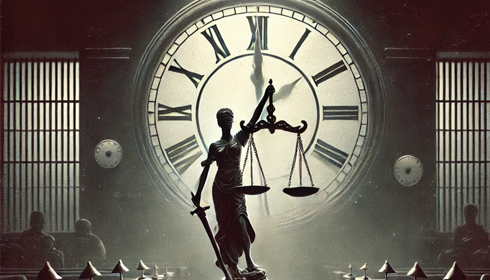
RG Kar Rape-Murder Trial to Continue in Bengal: SC
The Supreme Court of India, in a significant decision, declined a request to transfer the trial of the RG Kar Medical College rape and murder case out of West Bengal. The case, concerning the brutal rape and murder of a junior doctor at the Kolkata-based medical institution in August, has attracted nationwide attention, raising pressing questions about the security of healthcare professionals and the integrity of local law enforcement.
Chief Justice of India (CJI) DY Chandrachud, alongside Justices JB Pardiwala and Manoj Misra, presided over the proceedings. When a request was made to shift the trial to another state due to “disturbing circumstances” in West Bengal, CJI Chandrachud responded that no such move was necessary in this case. “Yes, we have done it in cases like Manipur. But we are not doing anything like that here. No such transfer,” he firmly stated.
This is the final hearing of this case overseen by CJI Chandrachud, who has been a strong advocate for judicial independence and the protection of fundamental rights. The decision not to shift the trial reflects his cautious approach in balancing regional concerns with the autonomy of the judiciary at the state level.
Allegations Against West Bengal Authorities Dismissed
Throughout the hearing, counsel for the petitioners alleged inadequacies in the local investigation and claimed that public confidence in the West Bengal judiciary and police had diminished. “The people of West Bengal have lost faith in the judiciary and police of the State,” one counsel argued. The CJI, however, was quick to dismiss such statements, calling them “canteen gossip happening in court.”
“Do not talk about people...who are you appearing for? Do not make such general statements,” he admonished the counsel, underscoring that generalized remarks about public sentiment cannot form the basis for judicial decisions. CJI Chandrachud emphasized that the judiciary operates independently and reminded the court that these claims must be substantiated with concrete evidence rather than conjecture.
Progress of the Case and CBI’s Role
The Central Bureau of Investigation (CBI), which took over the case due to public outcry, recently submitted a status report. It stated that charges had been framed against the accused, Sanjay Roy, by the Additional Sessions Judge in Sealdah on November 4. The trial is scheduled to proceed on November 11, with the opening of prosecution evidence.
One counsel raised concerns that the CBI’s findings merely mirrored those of the state police, alleging a lack of thorough investigation. CJI Chandrachud countered by clarifying that the trial judge holds the power to order further investigation if deemed necessary, reaffirming that the Supreme Court would not infringe on the authority of the trial court. This indicates the CJI’s stance on upholding procedural autonomy, allowing the local judiciary to operate without unnecessary interference from higher courts.
Implications for Safety of Healthcare Workers
In response to the heinous crime at RG Kar Medical College, the Supreme Court had previously established an 11-member National Task Force (NTF) to assess and improve safety measures for healthcare professionals across India. The NTF submitted an interim report during the proceedings, recommending enhanced safety protocols in hospitals and medical institutions to address both sexual and physical assault risks.
The report includes specific guidelines for state and central governments, urging medical colleges, hospitals, and health institutions to adopt proactive measures. The NTF also recommended that civic volunteers should not be solely relied upon for security at sensitive locations like hospitals. To address gender-based violence and ensure safe work environments, the report advised that state and central governments work collaboratively on implementation.
The Court directed that the NTF report be shared with Chief Secretaries across states and Union Territories, inviting them to review the recommendations and offer any further input. “The goal is to create a secure environment for healthcare workers,” an NTF representative noted, “and to tackle the persistent issue of gender-based violence and safety in medical institutions.”
A Broader Impact Beyond West Bengal
The Supreme Court’s decision not to transfer the trial has broader implications. It reinforces the Court’s stance that regional judicial bodies should be entrusted with sensitive cases, barring any extreme breakdown in law and order. CJI Chandrachud’s decision here aligns with his broader judicial philosophy of limiting the Supreme Court’s intervention unless absolutely warranted. In doing so, he leaves a lasting legacy of judicial restraint and trust in the trial courts to execute their responsibilities effectively.
The refusal to move the trial also places responsibility on the West Bengal judiciary and local authorities to uphold public confidence by conducting a fair and transparent trial. Any further lapses in the handling of the RG Kar case could reignite public outcry, placing immense pressure on state institutions to address safety issues for medical professionals, especially women.
The CJI’s Legacy
As CJI Chandrachud presides over his final hearing in this high-profile case, his decisions underscore a commitment to procedural independence and judicial dignity. His approach sends a message that while the Supreme Court stands ready to intervene in extreme cases of injustice, it is equally committed to preserving the autonomy of regional courts.
Reflecting on this stance, CJI Chandrachud remarked that the judiciary must “strike a balance between local concerns and national judicial integrity.” His tenure has been marked by a focus on transparency, procedural fairness, and the dignity of the judicial process, setting a standard for his successors.
In declining to shift the RG Kar rape-murder trial out of West Bengal, CJI Chandrachud emphasizes that justice need not always be sought from afar. His final decision in this case reiterates his faith in the regional judiciary’s ability to uphold justice, laying down a marker for local authorities to act with integrity and vigilance.